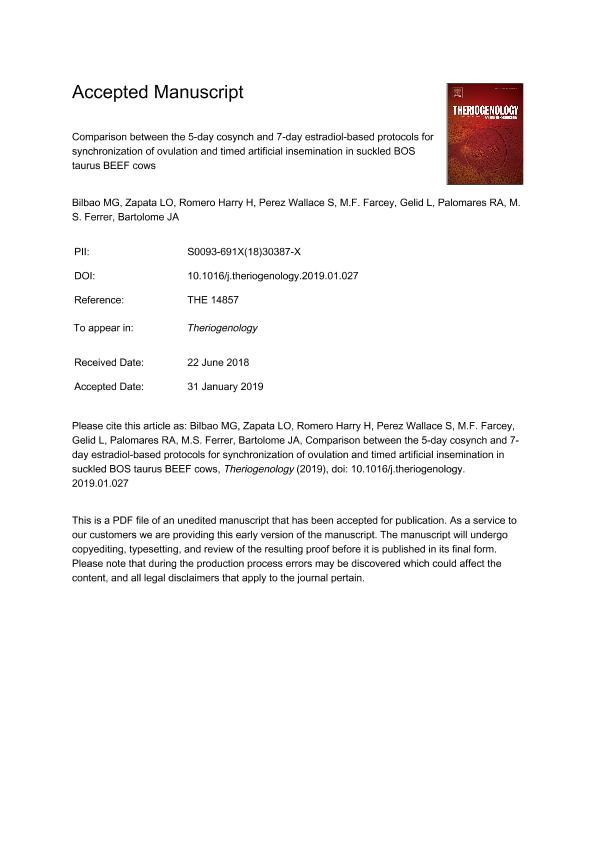Mostrar el registro sencillo del ítem
dc.contributor.author
Bilbao, María Guillermina

dc.contributor.author
Zapata, Luis Oscar

dc.contributor.author
Romero Harry, H.
dc.contributor.author
Perez Wallace, S.
dc.contributor.author
Farcey, Maria Florencia

dc.contributor.author
Gelid, Lucas Fernando

dc.contributor.author
Palomares, R. A.
dc.contributor.author
Ferrer, M. S.
dc.contributor.author
Bartolome, Julian

dc.date.available
2021-09-13T18:26:37Z
dc.date.issued
2019-06
dc.identifier.citation
Bilbao, María Guillermina; Zapata, Luis Oscar; Romero Harry, H.; Perez Wallace, S.; Farcey, Maria Florencia; et al.; Comparison between the 5-day cosynch and 7-day estradiol-based protocols for synchronization of ovulation and timed artificial insemination in suckled BOS taurus BEEF cows; Elsevier Science Inc.; Theriogenology; 131; 6-2019; 72-78
dc.identifier.issn
0093-691X
dc.identifier.uri
http://hdl.handle.net/11336/140238
dc.description.abstract
The objective was to compare pregnancy per AI and follicular dynamic in suckled Bos taurus beef cows treated with either a 7-day progesterone + estradiol-based protocol or a 5-day progesterone CoSynch protocol for timed artificial insemination (TAI) during four breeding seasons. We hypothesized that estrous cycle status, days postpartum (DPP), fat depth and plasma progesterone concentration differentially modify the effect of treatments. Every year, 9 days before initiation of each breeding season, cows were randomly assigned to one of two groups. Cows in the 7-d P + E group (n = 428) received a progesterone intravaginal device (DIB) and estradiol benzoate on Day −9. On Day −2 the device was removed, and cows received cloprostenol and estradiol cypionate. Forty-eight hours later (Day 0) cows received TAI. Cows in the 5-d P + CoS group (n = 428) received a DIB, and GnRH on Day −8. On Day −3, the device was removed, and cows received cloprostenol. A second dose of cloprostenol was given on Day −2. Cows received GnRH and TAI 72 h after device removal (Day 0). On Day −9, estrous cycle status was determined. In a subset of cows (n = 79) the size of the dominant follicle was determined between Days −2 and 0. In another subset of cows (n = 340), DPP, fat depth (mm) and plasma progesterone concentration (ng/mL) were evaluated on Day −9. Pregnancy per AI was determined 30 d after TAI. Pregnancy per AI was greater for cows in the 5-d P + CoS group than for cows in the 7-d P + E group (50.9% vs. 41.3%, P = 0.01) and was also greater in cyclic than in anestrus cows (54.3% vs. 33.2%, P < 0.0001). There was also a significant effect of breeding season (P = 0.0002) and sire (P = 0.03), and an interaction between treatment group and breeding season (P = 0.03). The dominant follicle was larger (P < 0.0001) in cows in the 5-d P + CoS group than the 7-d P + E group (10.7 ± 0.29 mm vs. 9.0 ± 0.28 mm). Pregnancy per AI was greater in cows with ≥55 DPP (47.0% vs. 29.6%, P = 0.001), fat depth ≥0.50 mm (44.7% vs. 29.7%), and with plasma progesterone concentration ≥1 ng/mL (47.2% vs. 28.7%, P = 0.01). In cows with plasma progesterone ≥1 ng/mL on Day −9, pregnancy per AI was greater in the 5-d P + CoS group (60.5%) than in the 7-d P + E group (34.9%), but there was no difference between treatment groups in cows with plasma progesterone < 1 ng/mL (P = 0.07). In conclusion, the 5-d P + CoS protocol resulted in greater size of the dominant follicle and pregnancy per AI in suckled Bos taurus beef cows subjected to TAI.
dc.format
application/pdf
dc.language.iso
eng
dc.publisher
Elsevier Science Inc.

dc.rights
info:eu-repo/semantics/openAccess
dc.rights.uri
https://creativecommons.org/licenses/by-nc-nd/2.5/ar/
dc.subject
ESTRUS SYNCHRONIZATION
dc.subject
TIMED AI
dc.subject
PROGESTERONE
dc.subject
ESTRADIOL
dc.subject
GnRH
dc.subject.classification
Ganadería

dc.subject.classification
Producción Animal y Lechería

dc.subject.classification
CIENCIAS AGRÍCOLAS

dc.subject.classification
Ciencias Veterinarias

dc.subject.classification
Ciencias Veterinarias

dc.subject.classification
CIENCIAS AGRÍCOLAS

dc.subject.classification
Biología Reproductiva

dc.subject.classification
Ciencias Biológicas

dc.subject.classification
CIENCIAS NATURALES Y EXACTAS

dc.title
Comparison between the 5-day cosynch and 7-day estradiol-based protocols for synchronization of ovulation and timed artificial insemination in suckled BOS taurus BEEF cows
dc.type
info:eu-repo/semantics/article
dc.type
info:ar-repo/semantics/artículo
dc.type
info:eu-repo/semantics/publishedVersion
dc.date.updated
2021-04-06T18:47:32Z
dc.identifier.eissn
1879-3231
dc.journal.volume
131
dc.journal.pagination
72-78
dc.journal.pais
Estados Unidos

dc.journal.ciudad
Massachusetts
dc.description.fil
Fil: Bilbao, María Guillermina. Universidad Nacional de La Pampa. Facultad de Ciencias Veterinarias; Argentina. Consejo Nacional de Investigaciones Científicas y Técnicas. Centro Científico Tecnológico Conicet - Patagonia Confluencia; Argentina
dc.description.fil
Fil: Zapata, Luis Oscar. Universidad Nacional de La Pampa. Facultad de Ciencias Veterinarias; Argentina
dc.description.fil
Fil: Romero Harry, H.. Instituto Nacional de Tecnología Agropecuaria. Centro Regional La Pampa-San Luis. Estación Experimental Agropecuaria Anguil; Argentina
dc.description.fil
Fil: Perez Wallace, S.. Zoetis SRL; Argentina
dc.description.fil
Fil: Farcey, Maria Florencia. Universidad Nacional de La Pampa. Facultad de Ciencias Veterinarias; Argentina
dc.description.fil
Fil: Gelid, Lucas Fernando. Instituto Nacional de Tecnología Agropecuaria. Centro Regional La Pampa-San Luis. Estación Experimental Agropecuaria Anguil; Argentina
dc.description.fil
Fil: Palomares, R. A.. University of Georgia. College of Veterinary Medicine; Estados Unidos
dc.description.fil
Fil: Ferrer, M. S.. University of Georgia. College of Veterinary Medicine; Estados Unidos
dc.description.fil
Fil: Bartolome, Julian. Universidad Nacional de La Pampa. Facultad de Ciencias Veterinarias; Argentina
dc.journal.title
Theriogenology

dc.relation.alternativeid
info:eu-repo/semantics/altIdentifier/url/https://www.sciencedirect.com/science/article/pii/S0093691X1830387X
dc.relation.alternativeid
info:eu-repo/semantics/altIdentifier/doi/http://dx.doi.org/10.1016/j.theriogenology.2019.01.027
Archivos asociados
